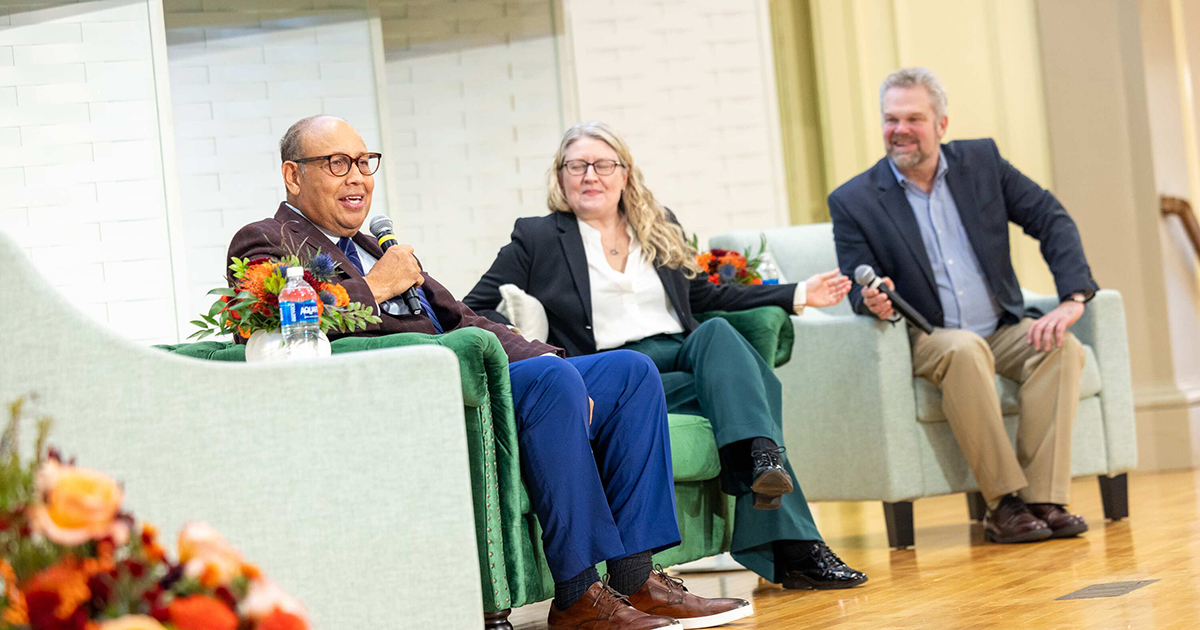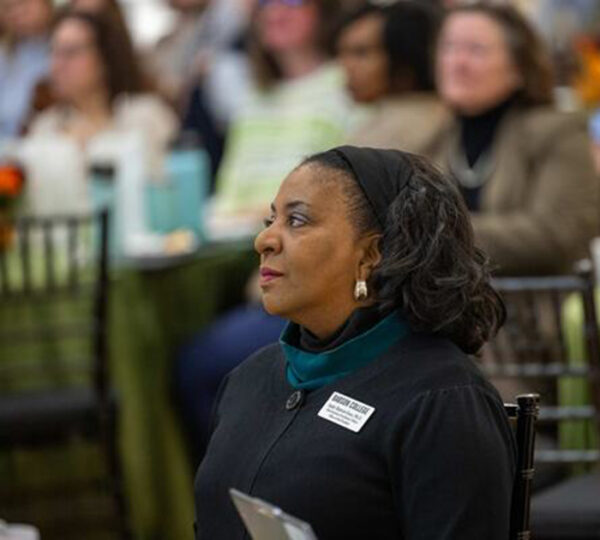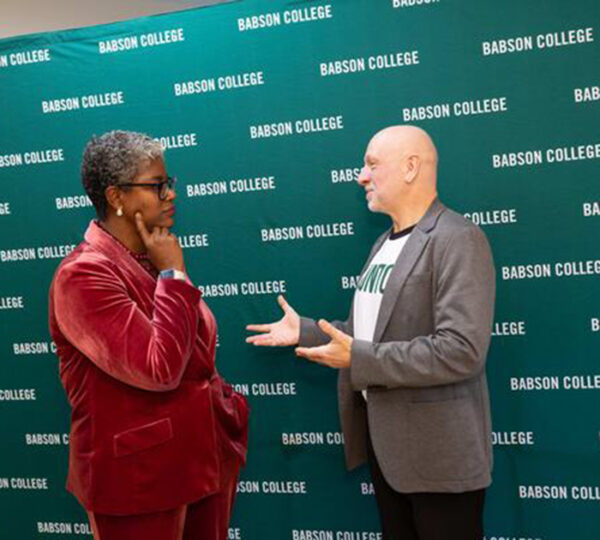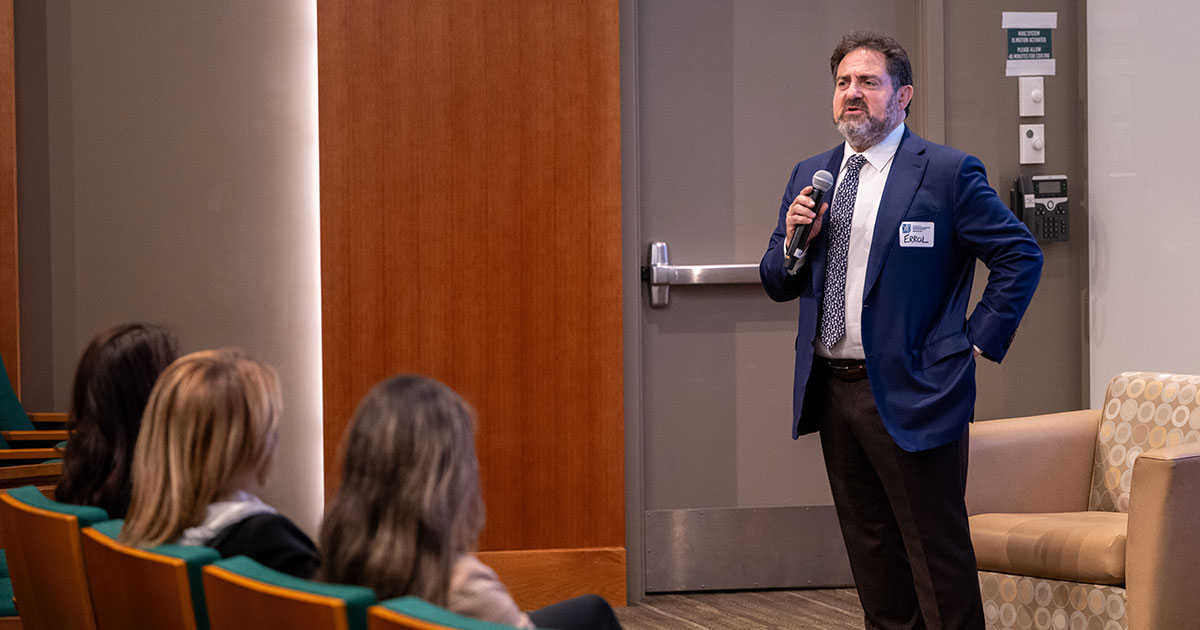Just Start: How to Turn Inclusive Excellence into Entrepreneurial Activity

From transforming the Seaport’s skyline to investing in historic Boston neighborhoods, real estate developer Richard Taylor has created his share of inclusive business opportunities.
Drawing on four decades of real estate leadership in Boston and beyond, Taylor detailed a career of development deal-making through an inclusive lens during his keynote address at Babson’s Inclusive Excellence Summit last week.
“Inclusion is not just a feel-good moment,” Taylor said. “It’s innovation. It’s better competitive positioning, better revenue, better overall performance.”
But inclusive opportunities require planning and continued effort.
“You have to be prepared to bring the challenge to the table. You can’t talk about inclusion if you don’t have a plan for it,” he said. “This aggressive approach to thinking with an inclusive lens, I view it as a strategy resulting in new innovation.”
Babson community members gathered to hear Taylor and discuss their own efforts to expand inclusion last week at Knight Auditorium at the third annual Inclusive Excellence Summit. The daylong event celebrates the College’s efforts to enhance innovation by expanding inclusive excellence.
Led by Chief Inclusive Excellence Officer Sadie Burton-Goss and the Inclusive Excellence Committee, the summit combined storytelling, strategy, and practical insights to illuminate how inclusion drives impact—both on campus and beyond.
In his welcoming remarks, President Stephen Spinelli Jr. MBA’92, PhD highlighted efforts to embrace all voices and reflect them in the College’s culture and curriculum.
“At Babson, we don’t just talk about inclusion; we embed it into the fabric of our institution. Inclusive excellence is not a side initiative, it’s a strategic imperative,” he said. “It drives innovation, sharpens decision-making, and strengthens our competitive advantage for our learners and for Babson itself.”
Inclusive Excellence in Practice
Taylor illustrated the innovative power of inclusion by discussing one of his best-known projects—the Omni Boston Hotel development. When deciding who would build the $550 million hotel, Massport, the state agency that owned the land, awarded significant points for inclusion and diversity.
Spotting an opportunity, Taylor built a team featuring minority and underrepresented architects, developers, and construction firms. Then, he got paranoid.
“One of the most important business books I’ve ever read is Andy Grove’s Only the Paranoid Survive,” Taylor shared. “Grove talks about business inflection points—moments when something changes a sector forever.”

Taylor, who briefly taught Babson’s trademark Foundations of Management and Entrepreneurship (FME) class, realized his competitors probably already had built similarly diverse teams.
So, he went further: carving out an investment vehicle offering $25,000 and $50,000 shares so that underserved investors—long shut out of large real estate deals—could participate. The experiment raised $10 million and became the decisive edge in winning the bid.
“My next question: Was this a one-off, or an inflection point?” Taylor asked.
To ensure it became the latter, he replicated the approach in several subsequent projects. In total, Taylor helped raise more than $50 million from underserved investors and exported the so-called Massport Model he created to cities such as Santa Monica, California, Philadelphia, and Chicago.
During the fireside chat that followed, Taylor and his fellow panelists, Babson Management Professors Wendy Murphy and Keith Rollag, discussed humility, curiosity, and comfort with failure as essential skills for inclusive entrepreneurial leadership.
Murphy emphasized the importance of asking “Who am I missing?” when forming teams or launching projects, and Rollag discussed the importance of giving and receiving feedback as a tool for building trust.
Taylor closed with a simple directive that captured the ethos of the keynote and the conversation: Just start—meet someone new, sit with someone different, take the first step. That, he stressed, is how inclusive excellence becomes entrepreneurial practice.
Babson Brave
Tina Opie, an associate professor in management, announced a new initiative at the summit called Babson Brave.

“We are living at a time where inclusive excellence is needed now more than ever, and in typical Babson fashion, we are hoping to lead these efforts,” Opie said.
The program is designed to weave inclusive excellence into every aspect of the College experience, expanding access to lifelong learning by increasing asynchronous courses and accepting more transfer students from community colleges. The plan would also strengthen Babson’s international bridge for global entrepreneurs through Babson Miami.
Panels throughout the summit highlighted tangible achievements across the Babson community from student-inclusion initiatives to expansive opportunities for diverse entrepreneurs at the Arthur M. Blank Center for Entrepreneurship, to faculty- and staff-focused inclusion efforts boosting wellbeing@babson.
Other inclusive excellence efforts highlighted were:
- Associate Vice President for Student Success Ryan Travia announced that the Stock & Exchange, a pantry that provides food and necessities to those facing food insecurity, raised more than $10,000 through a fundraising campaign this fall.
- The Glavin Office of International Education funded 25 first-time adult U.S. passports for first-generation and eligible students this year and is working to provide 20 more.
- The Hoffman Family Undergraduate Center for Career Development and the Graduate Center for Career Development detailed many inclusion efforts, including a new Intern Sponsorship Award to provide money for students in need who take unpaid internships.
“We view this event as a way for us to share with each other all the work that we’ve been proud of this year,” Burton-Goss said. These are initiatives that have made an impact across campus.”
Framing the work of inclusion as a practice that requires compassion, connection, and sustained commitment, Provost and Executive Vice President Ariel C. Armony urged attendees to embrace juntos—the Spanish word for “together”—as a guiding principle for collaboration across differences.
“I encourage you to carry that spirit when you return to your offices and classrooms, hold onto it,” Armony said. “Because inclusive excellence is not something we do once. It is a practice we continue always.”
Posted in Community




